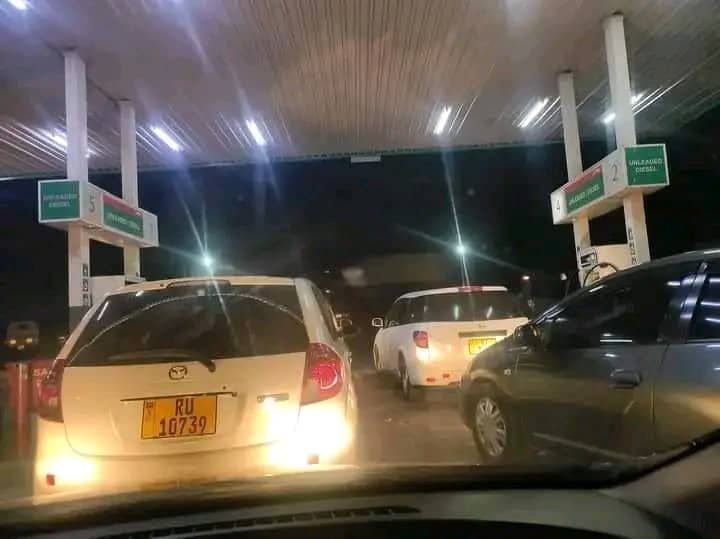By Burnett Munthali
Blantyre, Malawi’s commercial hub, is in the grip of a worsening fuel crisis, leaving residents and businesses scrambling for petrol and diesel. Long queues at fuel stations have become a daily sight, as motorists spend hours—sometimes even days—waiting to fill up their tanks. This scarcity has sparked widespread frustration and panic, with reports of fuel hoarding exacerbating the situation.
The fuel shortages have brought parts of Blantyre to a standstill. With many stations running dry, motorists have resorted to camping overnight at the few that still have fuel, hoping to be among the lucky few to get a rationed supply. For others, public transportation has become unreliable, with minibuses either hiking fares or refusing to operate due to the uncertainty of finding fuel. The result is chaotic traffic conditions, as commuters compete for the limited transport options available.

One of the key drivers of the crisis appears to be fuel hoarding. Several fuel station owners and private individuals are being accused of stockpiling fuel, either to sell it at a higher price on the black market or to guarantee their own supplies in case the shortage continues. These allegations have sparked anger among ordinary Malawians, who see this as an opportunistic exploitation of an already dire situation.
Social media has been flooded with the hashtag #FuelHoarding, as frustrated residents share stories of empty pumps while rumors circulate of hidden reserves being kept by unscrupulous dealers. Some videos and pictures have emerged online, allegedly showing people filling up dozens of containers, fueling speculation that hoarding is worsening the crisis.
The fuel shortage is having a crippling effect on Blantyre’s economy. Businesses reliant on transportation are feeling the pinch, with deliveries delayed and operations slowed. The cost of goods and services is beginning to rise as suppliers factor in the additional expense of securing fuel. In addition, sectors such as agriculture and construction, which depend on fuel for machinery, are bracing for disruptions in their work schedules.
Small-scale traders, such as those in the informal sector, are also bearing the brunt. Many rely on minibuses to transport goods to the market, but with fewer vehicles on the road and increased transport costs, their businesses are at risk. The ripple effect is hitting households as well, with rising costs contributing to the overall strain on the average Malawian family.
In response to the fuel crisis, the Malawian government has acknowledged the challenges but has not provided a clear resolution timeline. The Malawi Energy Regulatory Authority (MERA) has attributed the shortages to logistical issues, including delays in imports and a lack of foreign exchange, which has made it difficult to procure adequate supplies of fuel. However, MERA has warned against illegal practices like hoarding, promising to crack down on those caught withholding fuel.
The government has also appealed to the public to remain patient and avoid panic-buying, stating that efforts are being made to stabilize the fuel supply. However, with no immediate relief in sight, the situation continues to escalate, and public trust in the authorities’ ability to manage the crisis is waning.
As Blantyre remains in the grip of this fuel shortage, the situation could worsen unless swift action is taken to increase supply and curb hoarding. The people of Blantyre are demanding accountability and transparency from both the government and fuel suppliers to ensure that this crisis does not continue to spiral out of control.
For now, the #FuelHoarding hashtag continues to trend, as Blantyre’s residents wait anxiously for the pumps to start flowing again.


